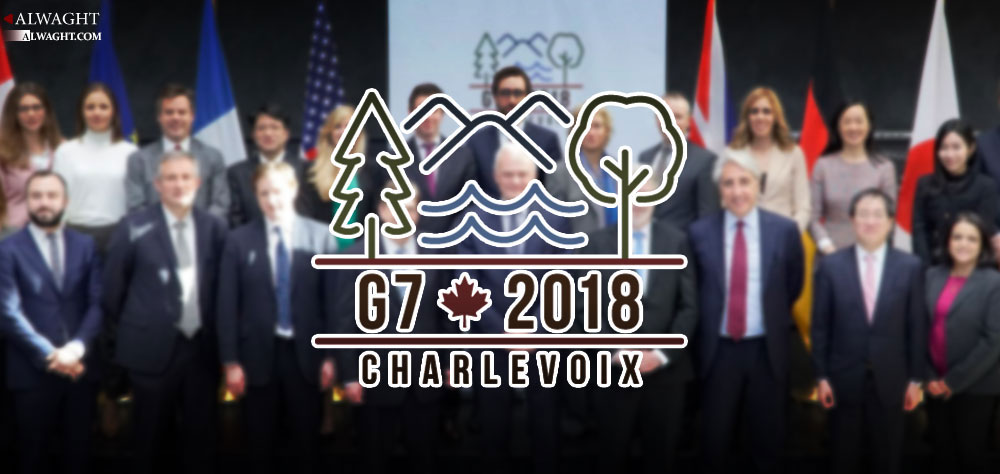Alwaght- The foreign ministers of seven industrialized counties (G7) held their meeting on Sunday in Toronto, Canada to discuss important global cases. Russian geopolitical challenges, Iran’s nuclear deal, Syria, Ukraine, and North Korea took center stage in the conference. Some of the discussed cases will be deeper debated in the upcoming annual meeting of the G7 leaders, set for 8-9 June. The bloc holds its conferences annually, each time hosted by a member nation.
When in 1973 oil prices hiked from $3 to $13, the world economy suffered a big shock. Many of the economic powers faced a deficit in their oil pays. Simultaneously, the Bretton Woods System, or the globally-adopted monetary mechanism, crashed. At the time, the economic heavyweights of the time– the US, France, Britain, Japan, Germany, and Italy– gathered together and formed Group 6 (G6) to address the economic turbulence. In the ensuing years, Canada and Russia came on board and the bloc was renamed to G8. The Western-Russian struggle over Ukraine in the past few years pushed Moscow out of the circle, making the bloc continue work as G7.
The meeting’s Anti-Russian agenda
The G7 is essentially meant to address the utterly economic issues, and over years worked to stabilize and secure the global economy and augment its predictability. Although France and Germany offered the idea, they in past few years failed to keep on the economic track. One reason was the entry of some powers in the security cases that had least relation to the economy and also adoption of agendas that put a premium on interests of such powers as the US.
The Sunday meeting was also overshadowed by the escalating West-Russia tension.
Foreign Secretary Boris Johnson of Britain has expressed concerns about what he called the Russian actions in “Syria and Ukraine.” Johnson added that there has been a recent agreement on the need for the Russian moves to be curbed to steer clear of what he called incidents like US election meddling and the Salisbury attack on former spy Sergei Skripal, both blamed on Russia.
Chrystia Freeland, the Canadian FM, also spoke out against Moscow saying that the G7 foreign ministers had “deep concerns” about Skripal case as well as the so-called Russian endangerment of democracies through election meddling.
At the present time, Russian-Western relationship is at its coldest mood since the Soviet Union collapse. The challenge has negatively affected the G7 realization of set goals. Russia was a key member of the alliance. With Russia included, the club accounted for 65 percent of global economy size. The World Monetary Fund in its Sunday report held that geological challenge posed the greatest risks to the global economy. Russian exclusion from the bloc will certainly lead to larger economic predicaments. So, an emerging Cold War that prompted chill in diplomatic Russia-West diplomatic overtures presents serious challenges to the group.
Challenges Ahead
The Sunday meeting also addressed Syria and North Korea cases. The FMs supported the April 14 US, British, and French airstrikes on the Syrian government’s positions. Despite the fact that the advocacy was meant to serve the Western interests and not the global economy, the Russian absence as a major actor has practically stripped the bloc of a power to take efficient decisions on Syria.
Asked what the final communique from the two-day meeting would say, Maas told reporters that "It establishes again that there will be no political solution in Syria without Russia ... and that Russia has to contribute its share to such a solution".
On the other side, President Donald Trump’s fresh trade war with China is expected to pose big commercial and financial risks that mainly go against the expectations of the G7. Fierce Chinese-American currencies’ battle, national currency manipulations, and introducing protectionist measures by the US all unleashed instability to the global currency rates. But to the surprise of all, this issue received no addressing in the recent meeting.
China, the world’s second-largest economy, accounts for over 15 percent of the gross world product (GWP). The US is going to great lengths to hinder China becoming a global economic hegemony. To this end, Washington and Tokyo are working out consistent and concentrated policies to build a trade balance with Beijing. In 2016 China strongly blasted the G7’s anti-Beijing stance on South China Sea dispute which had Japan’s back against China. Reports suggest that in forthcoming years, China will unseat the US as a global economic leader. Therefore, in the present conditions, the US and Japan, two allies and effective G7 members, cannot play a win-win game as they peruse their specific interests, something the analysts believe will prompt the bloc’s departure from its basic duty.
On the degree of success of the G7 and particularly its recent meeting, it should be noted that with regard to the cohesive US-led front against China and Russia, Trump’s neo-mercantilist policies, and disregard of such emerging economies as India, Brazil, and Spain, the economists cast doubt on the ability of the G7 to reach a consensus to make the world economy more predictable and less vulnerable to the non-economic global crises. Ostensibly for checking financial instability but genuinely for other secret drives the G7 in the past few years stepped into the security and political spheres. That has been a catalyst for divisions between its members and led to decline in its performance. This prompted boost of such world blocs as the G20. The uncertainties also push some countries to establish out-of-box, mutual business pacts with others to avert the global risks’ impacts on their domestic economy. Expansion of this relationship formula in the future will pose serious challenges to the capability of such powerful parties as the US and Europe to direct and lead the global economy.



























